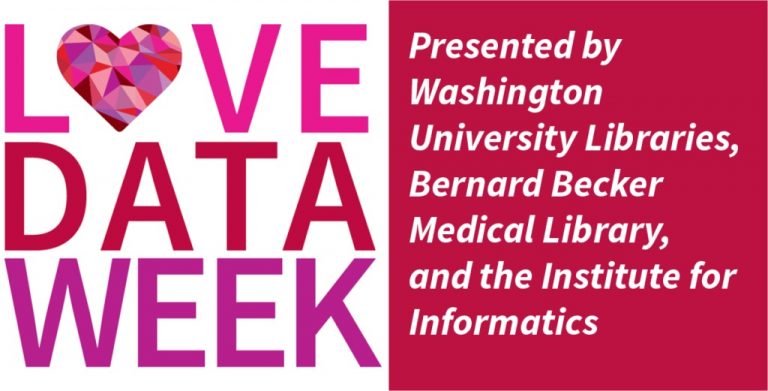
Love Data Week Recap
In February, Washington University hosted another successful Love Data Week. Going virtual did not keep the event from being a success. A total of 411 attendees took part in sessions on Zoom during the week of February 8–12, with an average of 41 attendees per event.

A collaboration between the Washington University Libraries, Becker Medical Library, and the Institute for Informatics, Love Data Week consisted of hands-on workshops, presentations, and lectures centered around data management, data analysis, data visualization, and handling a diversity of data types.
Workshops and Presentations in Brief
- Mollie Webb gave a workshop entitled Introduction to Social Explorer, which focused on accessing and spatially visualizing demographic data.
- Ebony Duncan-Shippy, assistant professor in WashU’s Department of Education, presented her methods of Qualitative Coding in Atlas.ti. Her presentation covered data analysis and key considerations in using qualitative data.
- Audrey McQuillan, Asa F. Seay Business and Economics Librarian, and Madjid Zeggane, database analyst at the Al and Ruth Kopolow Business Library, conducted a demonstration of Bloomberg terminals features, capabilities, and uses for accessing and accessing business data.
- Maze Ndukum, senior support scientist from the Becker Medical Library, guided participants through basic data analysis with Python. Ndukum provided data and other materials from the workshop to users.
- Madhurima Kaushal, a bioinformaticist at I2, provided a timely workshop on how to visualize COVID-19 data using R.
- Manan Schroff, the statistical data analyst for the Office of the Vice Chancellor for Research, walked participants through the process of recreating an interactive dashboard using Tableau.
- Diego Mendez-Carbajo, Senior Economic Education Specialist of the Federal Reserve Bank of St. Louis, gave a presentation on the Federal Reserve Economic Data Service, a tool that facilitates the access and visualization of economic and business data.
- Linda Cubias, Enterprise Success Manager at Lab Archives, introduced the Electronic Lab Notebook provided by WashU for research data management across teams.
- Chris Sorenson, senior support scientist from the Becker Medical Library, gave an overview of MDClone, a tool that gives researchers access to synthetic medical data.
Keynote Address
Carrie Wolinetz, NIH Associate Director for Science Policy, delivered the keynote address. Wolinetz discussed the future of data management and sharing and outlined the NIH Policy for Data Management and Sharing, which was released in fall 2020, replacing the 2003 policy, and will be effective on January 25, 2023. The new policy aims to foster rigorous and reproducible results by requiring good data stewardship practices for funded research. Data management through the lifecycle is key for enabling the validation of research results, making high-value datasets accessible, accelerating future research directions, and increasing opportunities for citation and collaboration.
When the NIH Policy for Data Management and Sharing was being developed, the NIH sought input from the public, tribal governments and entities and also obtained input from other government agencies. They plan to continue such outreach along with enhanced incentives for data sharing, such as providing data citations.
After the keynote, an engaging Q&A session included a number of interesting questions from participants. One such question expressed concern over the broadness of the policy, to which Wolinetz responded that while the “lion is in the details,” NIH deliberately did not create a more detailed policy to give PIs more control over their data management, since they felt that the PIs know their data best.
There were also questions about equitable data access and considerations regarding international access to data. In response, Wolinetz stressed the importance of not equating open access data to broadening access when privacy issues are considerations, and that risks associated with open data are not static and require continual review.
When asked about the role of data curation (the review, augmentation of documentation, and transformation of data for long-term access) in the sharing process, Wolinetz said, “data curators are worth the weight in gold,” but it’s important to consider data curation at scale. Given that data without documentation and proper treatment is often useless, curation is a worthy investment.
Love Data Week 2021 highlighted the multiple dimensions of data management, sharing, analyses, retrieval, documentation, visualization, and stewardship. These are issues that we, the Data Services team, aspire to assist researchers with every day. Please feel free to reach out to us with your data issues and questions. If we can’t help you, we will direct you to further resources. We thank all Love Data participants and attendees. We hope to see you at Love Data Week 2022!
